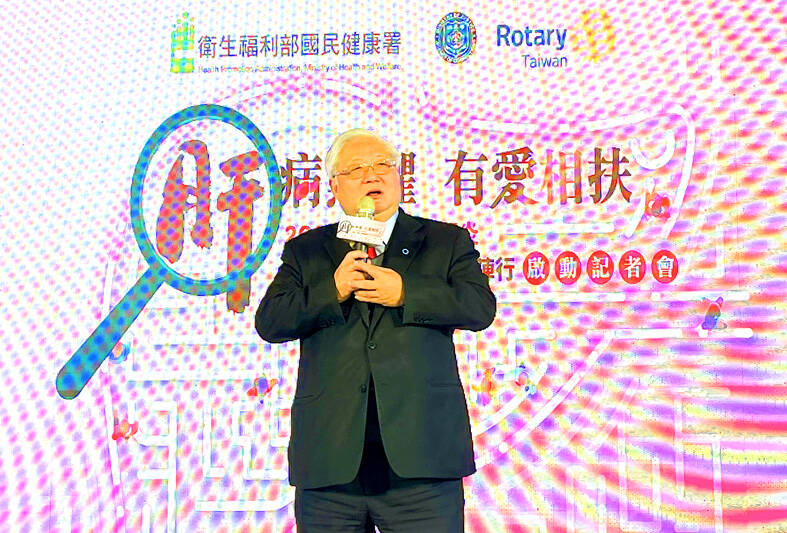The Health Promotion Administration (HPA) is considering expanding the eligibility for government-funded hepatitis B and C screening to include people aged 40 and older, and aiming to do that by July, HPA Director-General Wu Chao-chun (吳昭軍) said yesterday.
The WHO has set a target to eliminate hepatitis C as a public health threat by 2030, and while Taiwan is not a member, it has been making efforts to achieve the goal.
In 2020, the Health Promotion Administration (HPA) expanded government-funded hepatitis B and C screenings to offer a one-time, lifetime screening for adults aged 45 to 79, and for Indigenous people aged 40 to 79.

Photo: Lin Chih-yi, Taipei Times
The HPA last year increased the screening payment subsidy to NT$370 (US$11.31) as an incentive for healthcare facilities to provide the service, and it also offered rewards for referring people who tested positive for follow-up examination and treatment.
As of last month, more than 7 million people have received the screening and the liver cancer incidence in Taiwan has declined annually.
The incidence rate of liver cancer was 23.7 percent in 2022, lower than those of breast cancer, lung cancer, prostate cancer and colorectal cancer, Taiwan Cancer Registry data showed.
Taiwan has been making good progress in eliminating hepatitis C, Wu said.
The HPA expects the goal to be achieved this year and would send documents to an international organization to apply for hepatitis C elimination certification, he said, adding that there is still progress to be made in eliminating hepatitis C, and hopefully, it can be achieved by 2030.
Taiwan is the first country to carry out universal hepatitis B vaccination of newborns.
Liver cancer has long been the second leading cause of cancer deaths in Taiwan, and about 80 percent of people with liver cancer had been infected with either hepatitis B or C, Wu said.
As most people born before 1986 were not vaccinated against hepatitis B and therefore face a higher risk of infection, the HPA plans to extend screening eligibility to this group before they turn 45, he said, adding that early detection improves treatment outcomes and prognosis.
Expanding the government-funded screening program aims to encourage unvaccinated people and people approaching 40 years of age to get tested as early as possible, as waiting until age 45 might be too late, he said.
The HPA is planning a budget of NT$300 million for the initiative, which is expected to benefit more than 1 million people, he added.
Government agencies are working to complete the necessary administrative procedures, with the goal of launching the program in July, he said.

Right-wing political scientist Laura Fernandez on Sunday won Costa Rica’s presidential election by a landslide, after promising to crack down on rising violence linked to the cocaine trade. Fernandez’s nearest rival, economist Alvaro Ramos, conceded defeat as results showed the ruling party far exceeding the threshold of 40 percent needed to avoid a runoff. With 94 percent of polling stations counted, the political heir of outgoing Costa Rican President Rodrigo Chaves had captured 48.3 percent of the vote compared with Ramos’ 33.4 percent, the Supreme Electoral Tribunal said. As soon as the first results were announced, members of Fernandez’s Sovereign People’s Party

MORE RESPONSIBILITY: Draftees would be expected to fight alongside professional soldiers, likely requiring the transformation of some training brigades into combat units The armed forces are to start incorporating new conscripts into combined arms brigades this year to enhance combat readiness, the Executive Yuan’s latest policy report said. The new policy would affect Taiwanese men entering the military for their compulsory service, which was extended to one year under reforms by then-president Tsai Ing-wen (蔡英文) in 2022. The conscripts would be trained to operate machine guns, uncrewed aerial vehicles, anti-tank guided missile launchers and Stinger air defense systems, the report said, adding that the basic training would be lengthened to eight weeks. After basic training, conscripts would be sorted into infantry battalions that would take

GROWING AMBITIONS: The scale and tempo of the operations show that the Strait has become the core theater for China to expand its security interests, the report said Chinese military aircraft incursions around Taiwan have surged nearly 15-fold over the past five years, according to a report released yesterday by the Democratic Progressive Party’s (DPP) Department of China Affairs. Sorties in the Taiwan Strait were previously irregular, totaling 380 in 2020, but have since evolved into routine operations, the report showed. “This demonstrates that the Taiwan Strait has become both the starting point and testing ground for Beijing’s expansionist ambitions,” it said. Driven by military expansionism, China is systematically pursuing actions aimed at altering the regional “status quo,” the department said, adding that Taiwan represents the most critical link in China’s

‘REALLY PROUD’: Nvidia would not be possible without Taiwan, Huang said, adding that TSMC would be increasing its capacity by 100 percent Nvidia Corp CEO Jensen Huang (黃仁勳) on Saturday praised and lightly cajoled his major Taiwanese suppliers to produce more to help power strong demand for artificial intelligence (AI), capping a visit to the country of his birth, where he has been mobbed by adoring fans at every step. Speaking at an impromptu press conference in the rain outside a Taipei restaurant, where he had hosted suppliers for a “trillion-dollar dinner,” named after the market capitalization of those firms attending, Huang said this would be another good year for business. “TSMC needs to work very hard this year because I need a lot